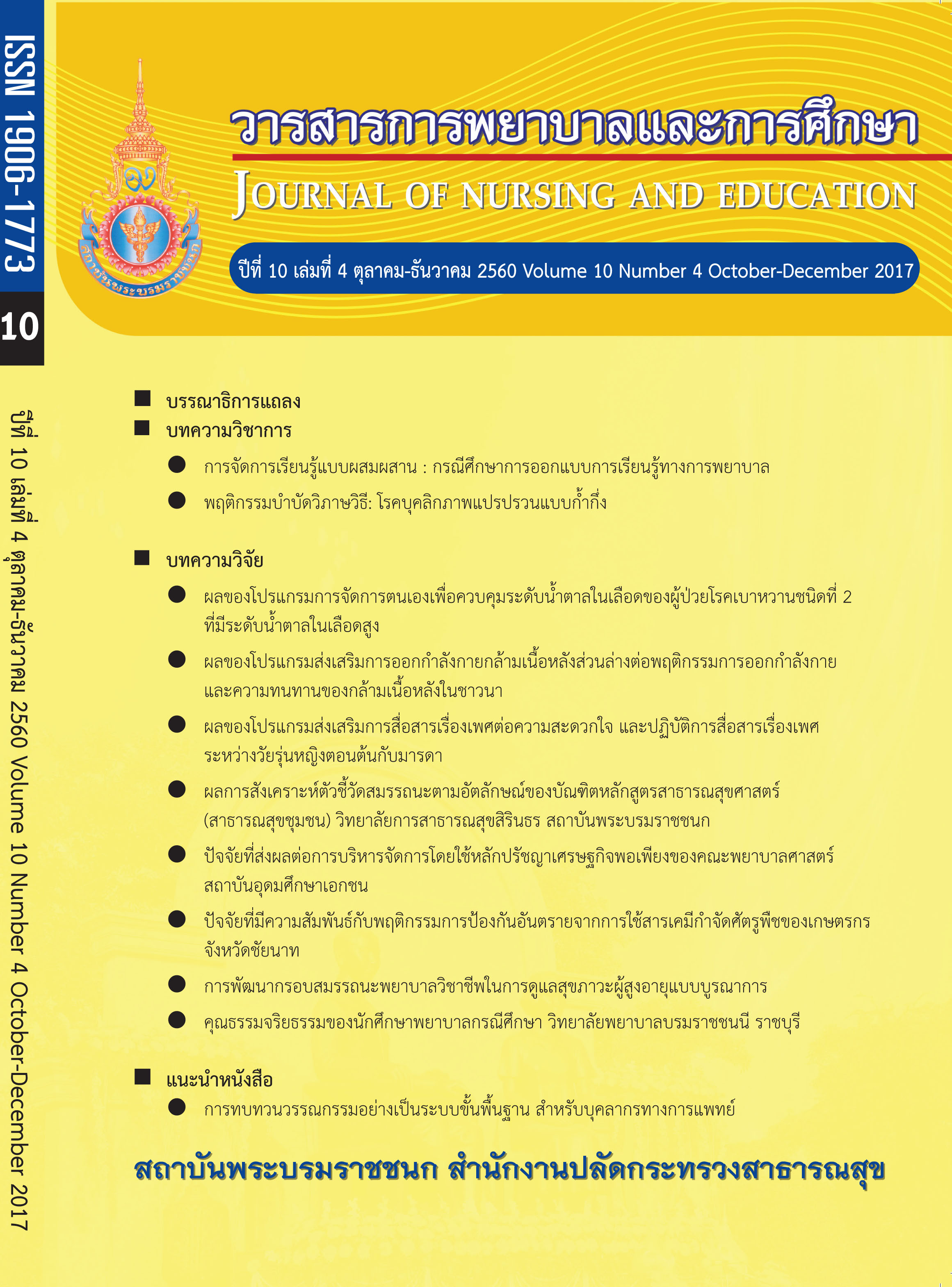ผลของโปรแกรมการจัดการตนเองเพื่อควบคุมระดับน้ำตาลในเลือดของผู้ป่วยโรคเบาหวานชนิดที่ 2 ที่มีระดับน้ำตาลในเลือดสูง
EFFECTS OF SELF MANAGEMENT PROGRAM ON GLYCEMIC CONTROL IN PATIENTS WITH TYPE 2 DIABETES.
บทคัดย่อ
บทคัดย่อ
การวิจัยครั้งนี้ เป็นการวิจัยแบบกึ่งทดลอง(Quasi-Experimental Research) มีวัตถุประสงค์เพื่อศึกษาผลของการใช้โปรแกรมการจัดการตนเองเพื่อควบคุมระดับน้ำตาลในเลือดของผู้ป่วยโรคเบาหวานชนิดที่ 2 ที่มีระดับน้ำตาลในเลือดสูง กลุ่มตัวอย่างจำนวน 66 คน แบ่งเป็นกลุ่มทดลอง 33 คน และกลุ่มเปรียบเทียบ 33 คน มีระยะเวลาในการทดลอง 12 สัปดาห์ เก็บข้อมูลโดยใช้แบบสอบถาม และการบันทึกระดับน้ำตาลในเลือดผู้ป่วยเบาหวาน กิจกรรมประกอบด้วย การบรรยายประกอบสื่อ การออกกำลังกาย การเดินจงกรม และการสนทนากลุ่ม วิเคราะห์ข้อมูลทั่วไปใช้สถิติเชิงพรรณนา ได้แก่ ความถี่ ร้อยละ ค่าเฉลี่ย และส่วนเบี่ยงเบนมาตรฐาน วิเคราะห์เปรียบเทียบความแตกต่างของคะแนนเฉลี่ยภายในกลุ่มด้วยสถิติ Paired Sample t-test เปรียบเทียบความแตกต่างคะแนนเฉลี่ระหว่างกลุ่มด้วยสถิติ Independent Sample t-test กำหนดนัยสำคัญทางสถิติที่ 0.05 และค่าความเชื่อมั่นที่ 95%CI
ผลการศึกษา พบว่า ภายหลังการทดลอง กลุ่มทดลองมีคะแนนเฉลี่ยของด้านความรู้เกี่ยวกับการจัดการตนเองของผู้ป่วยเบาหวาน ด้านการปฏิบัติตัวเพื่อควบคุมระดับน้ำตาลในเลือดของผู้ป่วยเบาหวาน สูงกว่าก่อนการทดลองและสูงกว่ากลุ่มเปรียบเทียบอย่างมีนัยสำคัญทางสถิติ (p-value <0.001) และหลังการทดลองกลุ่มทดลองมีระดับน้ำตาลในเลือดดีกว่าก่อนการทดลอง และดีกว่ากลุ่มเปรียบเทียบ อย่างมีนัยสำคัญทางสถิติ (p-value <0.001)
ABSTRACT
This quasi – experimental research aimed to study the effects of self management for blood sugar regulation of hyperglycemia in type 2 diabetes. The subjects were 66 patients randomly assigned to either the experimental or control groups, with 33 samples per group. The data were collected for 12 weeks using some questionnaires and record activities, media lectures, exercise, meditation, and group discussion. Data were analyzed using descriptive statistics, percentage, mean, standard deviation, the paired t-test, and the independent t-test. The results revealed as following:
- The experimental group had significantly higher score of knowledge regarding the diabetes mellitus and the practice of blood sugar regulation than the control group (p-value < 0.001)
- The experimental group had significantly lower blood glucose level than the control group (p-value < 0.001).
เอกสารอ้างอิง
1. Bureau of non communicable diseases. Report number and rate Die with no contact and injury. 2014. (in Thai)
2. Ritklar, L. Effects of a self management program on self management behaviors dispend, activities of daily living, and quality of life among patients with congestive heart failure. Nursing Journal Volume, 2012; 39(1) : 64 – 76. (in Thai)
3. Siprom, S. The Effect of Self Management Program for slow Chronic Kidney Disease Progression Knowledge, Health Behavior and Blood Pressure Levels. Thai Journal of Cardio-Thoracic Nursing, 2014; 25(1): 16 – 31. (in Thai)
4. Chirawatkun, A. Biostatistics of Health Science Research. Biostatistics Khon- khan University, 2008. (in Thai)
5. Konthairaipoong.(2016). Active Lifestyle. Retrieved June 1, 2017. Fromhttp://www.raipoong.com/content/detail.php?section=&category= &id=419.
6. Sansana wongsa. (2016). Exercise in diabetic patients and high blood pressure. Retrieved June 1, 2016. fromhttps://www.youtube.com/watch?v=e2oDGEL2NJA.
7 Diabetes Association of Thailandunder The Patronage of Royal Highness Prin- cess Maha Chakri Sirindhorn. (2017). Exercise for diabetics and the elderly. Retrieved June 1, 2017. from https:// www.youtube.com/watch?v=XZDx8A3G87g
8. FoodTravelTVChannel. (2017). Pak Wan Ban Soup with Ant Eggs. Retrieved June 1, 2017. from https:// www.youtube.com/watch?v=wEIsJWJJ_iI&t=12s
9. TomJoke FoodTV. (2017). Kang Om Gai. Retrieved June 1, 2017. from https://www.youtube.com/watch?v=h-oF-i3qYM4.
10. RK Thai Kitchen & Beyond. (2017). Tom Yum Tilapia Fish (Thai fish soup recipe). Retrieved June 1, 2017. from https://www.youtube.com/watch?v=zrl4JhmcE5E&t=68s.
11. National Health Security Office. (2014). Next door Doctors. Retrieved June 1, 2017. from https://www.youtube.com/watch?v=Ce5fBqjf91w.
12. Chaitaow, T. Effects of a self management support program in patients with Chronic obstructive pulmonary disease on knowledge self management Behaviors dyspnea, and lung function. Master of Education Burapha University;2015. (in Thai)
13. Ulittaphon, P. Using health behavior modification Program for patients on
framework of the health belief model and the theory self-efficacy with type 2 diabetes patients. Community Health Development Quarterly Khon Kaen University, (2015); 3(3): 441- 452. (in Thai)
14. Grewsung, A. Effects of in self health care program by application of health belief model and social support for diabetes patients type 2 in health promotion hospital Kummei Hurnakum Subdistrict Srithart District Udonthani Province. Health Systems Research Institute, 2014; 7(2): 334 - 346. (in Thai)
15. Hamwong, S. Effect of health education program using applying self efficacy theory and social support for type 2 diabetic patients at Nhongkunpueak Health Promoting Hospital, Nhongkungsri District, Kalasin province. Srinagarind Medical Journal, 2013; 28(4): 451 – 460
16. Chisung, P. Yakasam, P. Patthong, N. The Effectiveness of Promoting Self-Care Behavior Program on the Self-Care Behavior Among People. With High Blood Glucose Level in the Community. HCUJOURNAL, (2014); 18(35): 1-12. (in Thai)






